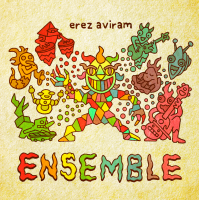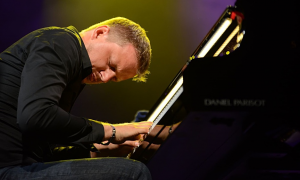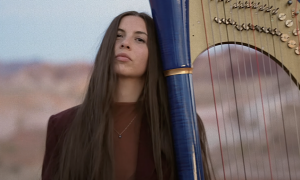Home » Jazz Articles » Interview » Mose Allison: Substance and Style
Mose Allison: Substance and Style
Those that know his work—and that audience is growing, he says—are attracted to his simple, bluesy style as well as his witty, observational way with a lyric. He has a warm, deep tone that doesn't have a lot of range, but don't worry about it. It's meant for story telling, not arias. It invites you in. Pull up a chair.
Is it jazz, blues, country blues, folksy jazz?
Who cares? Maybe it's all of that.
Some in the industry have an obsessive need to know exactly what box a product must be squeezed into. They spend time sweating such things. But the issue doesn't concern Mose Allison, who's been doing what he does for half a century now.
"People have been tryin' to do that [categorize him] for years. I have no idea what I'm doin.' I've never seen me," he says good-naturedly.
So how DO you describe his style?
"I wouldn't," he says with a warm Southern chortle.
But he can push the jester in him aside.
"I just have a lot off different influences. I'm just tryin' to play jazz, which is improvised music, and I'm tryin' to write the songs that I write and they express a certain point of view, a certain temperament.
"I just try to do as good job with the material as I can and play some jazz as well, some improvised music, and do that every night. Just see where it goes."
Not a bad gig for someone who'll be 74 this fall.
If you only knew
what can happen to a man for tellin' the truth
If you only knew
All the scruples that go down in gin and vermouth
Mose Allison isn't anywhere near a wild man on the loose or primate on the prowl. Nor is he a natural born malcontent. He's unassuming; even self-effacing. He's a southern gentleman, who still maintains a gentle drawl even though he makes his home on New York's Long Island. He's calm and jovial at the same time.
"I'm playin' the music I like. I'm playin' music for a certain type of person. Fortunately, there are more and more of us. At least there are more comin' to see me than there were 30 years ago or so."
It's true that despite the up and down cycles jazz goes through, Mose continues to play, record, work steadily.
The New Yorker has called him a national treasure and British bluesman John Mayall once said everyone he knows in England was raised on his music. Legions of other musicians—like Bonnie Raitt, Peter Townshend, Van Morrison (dig his album of all-Mose material)—sing his praises.
All that from a man who was once given a rather dim vision of the future by his childhood piano teacher.
"The idea was I'd never amount to anything in music," he says. "The theme there was that I was talented, but I wouldn't work hard enough to do anything with it."
More irony there than in a Mose Allison lyric. Well—close, anyway. Not only is he known as a fine pianist, but he's called a cynic, satirist, even sage for his musings about the world around him and the people in it. His songs often strike a familiar chord, some shrouded with an ironic twist and others cutting right to the chase in particularly wry fashion.
And when it comes to interpreting his songs, everyone should lighten up, this Mississippi bard contends.
I've been doin' some thinkin'
'bout the nature of the universe.
Found out things are gettin' better.
It's people that are gettin' worse
"These people that think I'm cynical, I wish they'd come to see my shows these days because I've turned into a comedian, practically," he says, chuckling. "I get laughs all the time now. The songs they used to think were cynical, now they're laughin' at 'em, which is what was intended in the first place. The cynical thing was just a superficial appraisal. They didn't really get it.
"There's a few tunes of mine that don't have jokes, but most of them have a joke and they have a humorous point of view somewhere," he says. "You got to laugh. What else can you do?"
"There's an American poet, Kenneth Pachen, that I like a lot," Mose adds. "He had a phrase that he used: 'Halleluiah, anyhow.' That's kind of my philosophy. There's a lot of terrible things goin' on all the time, but you gotta try and have some fun in the end."
And fun is just what he has, through the hard work it takes traveling from place to place and trying to put on a quality performance each night. He brings with him a disarming sense of humor. And while some artists play for a long time before they hit a stride or find that direction they were meant to pursue, Mose had his humor and his singing way back when.
"I sang and wrote songs when I was 12 years old. I wrote a song called 'The 14-Day Palmolive Plan' when I was about 13, and I used to play it at parties all over the place. It was about radio commercials. That was the first song I remember writing. I wrote some others about that time," says Mose.
"I've heard some tunes in recent years that were pretty close to that same idea. The idea was you turn on the radio and you want to hear some music and up comes a commercial."
He also says he comes by the humor naturally.
"I think it's genetic. I'm readin' a lot of books about neuroscience and all that and sociobiology. It turns out, it looks like, at the moment, they think just about everything is wired in. It can be changed. Your culture and your upbringing has some effect on how you are, but a lot of it is just wired in to start with."
"In the part of the country I grew up in, and at the time, during the Great Depression and everything, that sort of molded my point of view. In the Mississippi Delta, nobody says anything straight out. Everything is exaggerated or understated and there's a lot of humorous sayings and all that. So I was introduced to all that early."
So there are those that call him part philosopher (he did study it at LSU), but when it comes to assembling the lyrics that eventually make us laugh, don't picture Mose Allison locked up in a room sweating
Lock up you wife and hide your daughter
Let's do things we shouldn't oughta
"I never sit down and write. I just sorta let things form in my brain. I'm always storing away phrases and ideas and things that I think might turn into songs. I'll go for months without doing anything and all of a sudden I'll decide to work on somthin' for some reason. Maybe it's been reintroduced to my mind about somethin' that's happened or somethin' like that.
"It's not systematic, for sure. People ask me, 'Do you go sit down and write all the time?' I've never done that. It always happens just mentally. I don't do anythin' further than that until I get the song pretty much shaped up in my head, then I go to the piano and start messin' with it."
No. Not a bad gig at all. Fifty years and going strong.
"I started workin' in 1950. Lake Charles, Louisiana, was my first 6-night gig. So I'm in my 51st year of playin' mostly nightclubs. I do some concerts," says Mose.
Though he bemoans the shortage of good jazz clubs, "I manage to stay pretty busy, regardless. I work a lot of different types of rooms. They're not all jazz rooms. I can work different things. I've been able to do pretty well. I don't work as many consecutive nights as I used to, but I'm still working over 100 nights a year, so that's good for me.
"It's as much fun as it ever was, you know, once I get there. Gettin' there is a little harder. Traveling these days has a lot of problems and also it wears you out more."
Don't you talk to me about life's problems
or how you wish that things could be.
I don't have trouble livin'
It's dyin' that bothers me
Traveling may wear him out more in his seventh decade, but it was the rule as a youngster when he went from the Mississippi Delta to the west and southwest in little combos. "A friend of mine had a club in Jackson, Mississippi. I went in there with a quartet and stayed there for a while. I figured as long as I can play and make a living, I would do that. If I can't do that, I'll worry about it and try and figure somthin' else out.
"Fortunately, I had a bassist, Taylor LaFargue, who had a car and was willing to go wherever there was a gig. We knew different drummers, so we just drove from town to town. Tried to get a job and worked somewhere as long as it held up. That went on until about '56 when I moved to New York. I finally decided if I was going to make a living, I was gonna have to come to New York.
"The jazz boom was goin' on then so there was a lot happenin' in New York at that time. It was real excitin,'" he recalls. There was the usual slow start, weekend jobs, spotty gigs, until reputation and work grew.
All the while, singing was part of the act.
"My main influences have always been the classic jazz players who sang, like Louis Armstrong and Nat King Cole and Jack Teagarden. Louis Jordan, I always liked him as well. The thing of playin' and singin' never bothered me," Mose says. "I just thought they went together."
In 1957, his Back Country Suite on Prestige Records hit it big, and just about everything he has recoded since has had critical acclaim and solid core audience. His resume includes working with jazz greats like Stan Getz, Al Cohn, Zoot Sims and Gerry Mulligan
So whether it's jazz or blues or both, it's Mose. Unmistakably Mose.
"I read a recent interview with [venerable octogenarian jazz artist] Jay McShann. One of his lines was: 'I always thought blues and jazz went together.' That knocked me out because that's the way I started out. All the classic jazz players all sang and a lot of 'em sang blues," he says.
Mose developed a unique and personal way with a song, whether it's his own or someone else's.
"At this point, I don't listen to other people too much. I'm not really that affected by anyone. I went through the whole number, you know. The swing era, the boogie woogie era, the bebop era. Thelonious Monk is still one of my favorites. So a lot of these people had their effect on me. And Lennie Tristano I like a lot, I still like him. Then I started listenin' a lot to classical composers. Piano works. Just to see what they were doin.' That sort of put me in a different groove to try to blend all that in," Mose explains.
"As far as I'm concerned, the essentials of jazz are: melodic improvisation, melodic invention, swing, and instrumental personality. All of the great jazz players have had instrumental personality. You can recognize them by the way they played. Those were the three things that sort of guided me.
"I can't judge my own stuff. That's for others. But those are the three things that I admire."
And what about the future of jazz? It's the question on people's lips every decade or so. Everyone seems worried about it again of late, with the lack of visionaries like Miles or explorers like 'Trane, and disagreement between traditionalists and those trying to expand the art form.
But Mose is detached and unaffected; he views it much like sitting on a rocking chair on a Mississippi front porch, watching it go by.
"I've never been concerned with that. I've just done my thing," drawls Mose. "I'm pretty much self-centered in that way. I don't try to predict what's gonna happen to jazz or anything like that. Nobody knows what jazz is."
Besides, there are always new adventures around the bend.
What's your movie?
Are you the artist that's misunderstood?
The bad guy tryin' to do good?
Or just the nicest fella in the neighborhood
Allison was summoned to Hollywood last year by director Frank Oz, a Mose fan, for a scene in the upcoming movie "The Score," that stars Robert DeNiro and features Marlon Brando. (Set for a July release, Paramount). He said he had some fun, but is now skeptical that he will make the final cut.
"That remains to be seen. I try to get people not to say anything about that. I've had a lot of flirtations with the movie business and half the times it didn't materialize. Something that was supposed to happen, didn't.
"But the word I got now is that they changed the plot and I don't know if I'm going to be in it or not. Prob'ly not," he said, not really knowing, but not wanting to get his hopes up. "You never know about these things. A lot of people work on it. Sometimes a little plot change will take your part right out. Actors are always complainin' about their best scene being take out."
In the film, DiNiro is a criminal who's trying to go straight and owns a jazz club. Mose played a tune, his own "City Home," in a scene with DiNiro and Brando
"I did the whole tune and it took all day. I did it about 30 times. They shot it from different angles and all that. At the time, they were telling me I'd be able to play the whole tune during the movie. But now [with the change] there's action going on, so I don't know if they'll show me or not. It was hard. It wasn't fun, after about the fifth time.
"I tried to get as much out of it as I could. It was a nightclub situation. They had a set that was just like the kind I play in and they had an audience was just like the kind of people I play for," he says. "I got there about 8 in the morning and I got away from there about 9 at night, something like that."
"Who knows?" he says in easy-going fashion. "Just wait 'till it comes out and see if I see myself there."
I've been so far, I must be back
Airline, highway, railroad track
Won't you tell me where we are
I've been so far
And so it goes for this travelin' man. Taking life as it comes. Making people happy. And playing good music that will, whether he knows it or not, stand the test of time. If he ever stopped, he'd be missed. But stopping isn't in his plans.
"I been getting good crowds. It only took 50 years," he laughs. "But I got an audience that knows what I do. They usually show up, so I usually do pretty good."
He said it now includes daughters and sons of his original fans, "so I get a lot different ages."
A lot of singer-performers are in vogue now—like Dianna Krall and John Pizzarelli—and it seems the dual talent is currently a good way to get marketed. But Allison hasn't given that much thought. He's heard some of them, but doesn't seem to pay them any mind. He's just gonna mosey along, unconcerned.
"They do a completely different thing than me, anyhow," he says. "Those are singers who are doin' standards. I do very few standards. Hardly any. Other people's tunes that I do are usually obscure tunes, for the most part, although I do a couple of Duke Ellington tunes that are well known.
"The category that I'm usually put in with is like Dave Frishberg and Bob Dorough. Because we were all jazz players and we were all around New York in the late 50s and early 60s. They're friends of mine. But we're different as well. There's a lot of difference in our styles. So I don't know.
"I'm still waitin' to get a fair appraisal," he says in a smiling tone. "I don't know whether it'll happen or not. Maybe after I'm dead in 30 years or so."
Ever since the world ended
I don't go out as much.
People that I once befriended
just don't bother to stay in touch.
Things that used to seem so splendid
Don't really matter today.
It's just as well the world ended
It wasn't working anyway
With a new live CD out recently [The Mose Chronicles—Live in London, Volume 1 ] and a second one coming (Volume 2), you can expect to hear and see more of Mose. His touring schedule is still strong.
"I do some concerts. At the moment, I'm being helped a lot by a gig I play in London, which is Pizza Express," says Mose about the venue where his live CD was recorded. "I play there six weeks a year, six nights a week. It's the only place in the world I've ever been, ever seen, ever heard about where a jazz player can work six weeks a year. Two three-week engagements a year, six nights a week. There's never been anything like it in this country.
"In Europe, it's mostly one-nighters. There's very few clubs that go more than one or two nights. Pizza Express has been a real godsend for me. I've been working there for several years, six weeks a year. You can go to work every night and play. It's a nice little club. It's just about the right size for me, about 150 people.
"Of course I still have my clubs here that I work in the US. I get some concerts. With the people I know over the years, I get some jobs just from somebody that's been a fan a long time, or with a musician I've played with a long time. Everything figured in together, I usually stay pretty busy."
He could rest on his laurels after 50 years, but like so many jazz musicians, staying busy is just part of life's routine.
"I haven't stopped and I don't plan on stoppin' any time soon," Mose avows.
"So far, so good. I still dig playin' and I enjoy it. I think I learn more about it all the time."
Tags
PREVIOUS / NEXT
Support All About Jazz
 All About Jazz has been a pillar of jazz since 1995, championing it as an art form and, more importantly, supporting the musicians who make it. Our enduring commitment has made "AAJ" one of the most culturally important websites of its kind, read by hundreds of thousands of fans, musicians and industry figures every month.
All About Jazz has been a pillar of jazz since 1995, championing it as an art form and, more importantly, supporting the musicians who make it. Our enduring commitment has made "AAJ" one of the most culturally important websites of its kind, read by hundreds of thousands of fans, musicians and industry figures every month.




























